The Sports Report Olympics Edition: Athletes creating their own energy
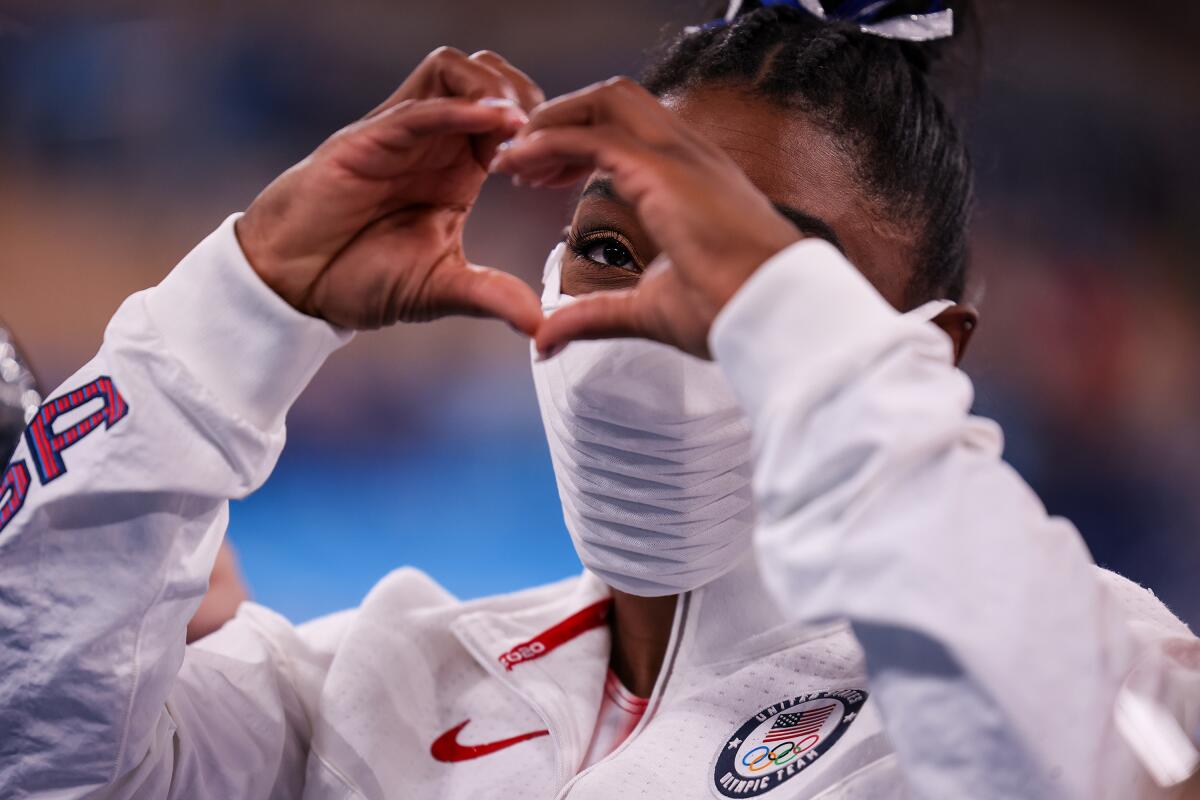
- Share via
TOKYO — With less than a week remaining in these Tokyo Olympics, I’ve positioned myself to win gold in the obscure discipline of going all around (get it?).
Good morning everybody, my name is Ben Bolch, curator of this edition of the Olympics newsletter. Among the venues I’ve checked out are gymnastics, golf, basketball, softball and track in addition to indoor and beach volleyball.
On Tuesday evening, I was headed to equestrian to watch Jessica Springsteen and show everybody who’s the boss in logging miles on buses with annoyingly cheerful voices — at 2:30 a.m., anyway — generated by the GPS.
Before we get to my thoughts on each venue and which sport most misses fans, let’s get to some of the more important stuff.
Latest Olympics news and results
Tuesday and Wednesday TV schedules
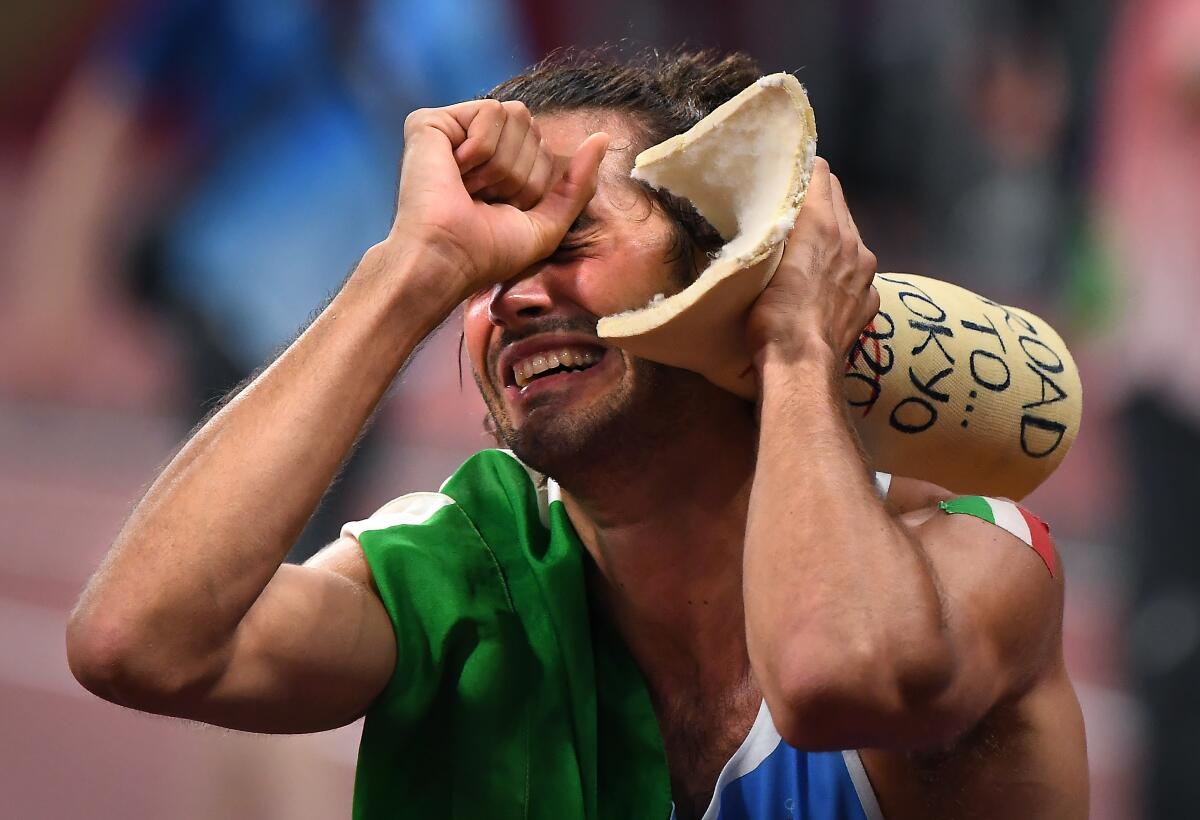
There’s a widespread notion that there are no fans at these Summer Games. It’s not true. A few venues outside the hub of Tokyo venues have permitted ticketed fans, but the only ones sitting inside most places are athletes and coaches supporting competitors from their countries.
Raven Saunders quickly discovered how to get almost everyone seated in one end of Olympic Stadium on her side. The shot putter from Charleston, S.C., clapped her hands over her head before each of her throws, spawning copycats not just from spectators there to support the United States.
Generating one’s own energy became a theme, several runners saying they had to pump themselves up in a venue where fan noise can sustain distance runners or give sprinters an adrenaline boost as they near the finish line.
Jade Carey was bolstered by her own small but vocal cheering section inside the Ariake Gymnastics Centre. The supporters included her father, Brian, who doubles as her coach, as well as teammates and U.S. gymnastics staffers. The decibel level rose with every move as Carey wowed those watching her win the floor exercise to capture her first Olympic gold medal.
Go beyond the scoreboard
Get the latest on L.A.'s teams in the daily Sports Report newsletter.
You may occasionally receive promotional content from the Los Angeles Times.
Getting lulled into a malaise was impossible at the beach volleyball venue known as Shiokaze Park, where DJ Roueche filled the dead air between points with bursts of heart-pumping sound. Roueche, who also works as the Lakers’ DJ, also played a personal favorite of players during introductions, ensuring they were adequately inspired before launching the first serve.
Whoever ran the sound system at Ariake Arena, the venue for indoor volleyball, played upon the U.S. team’s presumed allegiance to music made in its homeland. Old favorites such as Van Halen’s “Jump” got recycled after every point that went to the Americans.
Noise was verboten at Kasumigaseki Country Club, where the hush was easier to maintain since Japanese fans weren’t permitted to line the fairways in support of homeland hero Hideki Matsuyama. The course was immaculate, but the suffocating heat and humidity made one wish these Games were being staged in, say, October.
Stifling conditions also mandated adequate hydration at Yokohama Stadium, site of the baseball and softball competitions. This venue’s top selling point was its stunning view of the surrounding Yokohama skyline beyond the outfield, a vista that compared favorably with any of those in Major League Baseball.
But the most stunning visual in these games could be found inside the 37,000-seat Saitama Super Arena. It was CUE5, the basketball robot that roams the court, sinking free throws, three-pointers and halfcourt shots like some superhuman Stephen Curry.
The automaton was nearly automatic, making it worthy of cheering no matter your allegiance. As Styx once put it, domo arigato, Mr. Roboto.
Flowery tribute
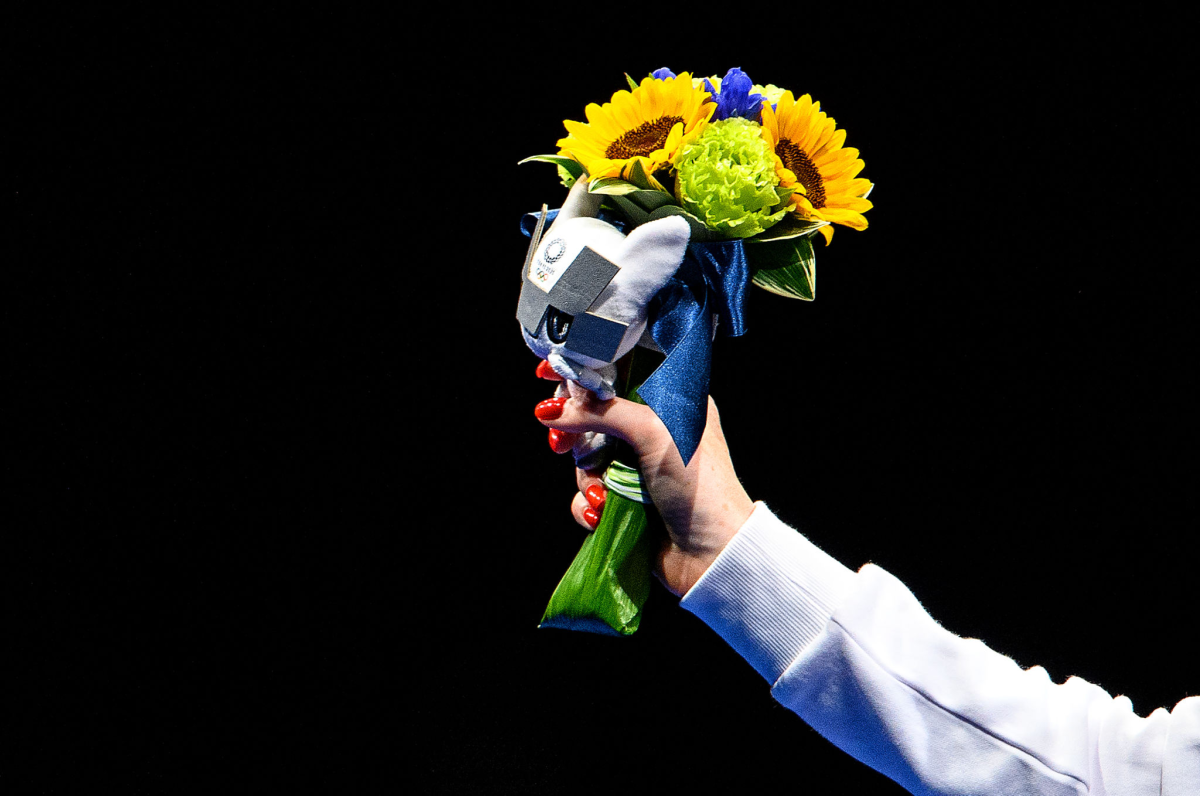
The bouquets given to medals winners at the Summer Games hold special significance.
They’re grown primarily in areas devastated by the Great East Japan Earthquake and Fukushima Daichii nuclear disaster of 2011, providing a chance to bring attention to those areas and honor residents who were impacted.
According to Vicky Salmon, head florist at Interflora, the bouquets include eustomas and Solomon’s seals grown in Fukushima, sunflowers from Miyagi, gentians from Iwate and aspidistras from Tokyo.
Pac-12 representing at Olympics
Call it the Conference of Olympic Champions.
Entering Tuesday, athletes with Pac-12 Conference ties had won 37 medals. If the Pac-12 was a country, it would have trailed only the U.S. (64), China (62) and the Russian Olympic Committee (50).
Somebody put Bill Walton on a plane so that he can carry a Pac-12 flag at the closing ceremony.
Enjoying this newsletter? Consider subscribing to the Los Angeles Times
Your support helps us deliver the news that matters most. Become a subscriber.
Gymnastics
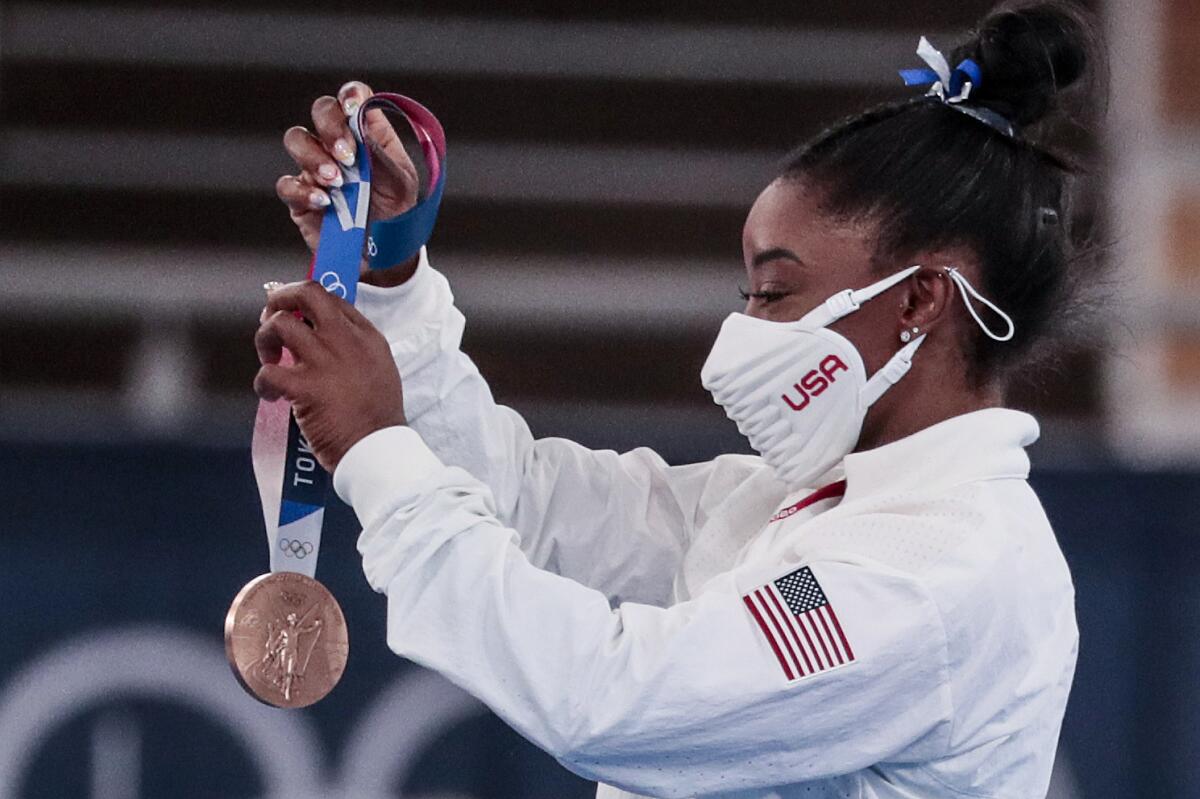
Helene Elliott on U.S. gymnastics: Superstar gymnast Simone Biles, who withdrew from most of the events on her Olympic schedule after experiencing a lack of awareness in the air that jeopardized her safety, made a remarkable return to the gym floor on Tuesday and won a bronze medal in the balance beam final on the last day of competition at the Ariake Gymnastics Centre.
Biles joined teammate Suni Lee in the balance beam final and performed a routine that scored 14.000 points. Before that, Biles had last competed in the women’s team final on July 27. In that event she performed one unsteady vault and then scratched from her other events that evening, later explaining her problem as a bout with “the twisties,” which afflicts gymnasts and throws off their timing and spatial awareness. The other U.S. women stepped up to win a silver medal.
Lee, who later won gold in the all-around event and bronze on the uneven bars, had a major wobble on the beam and scored 13.866 to finish fifth in Tuesday’s event. Guan Chenchen of China (14.633) won gold, followed by Tang Xijing of China (14.233) and Biles.
Track and field
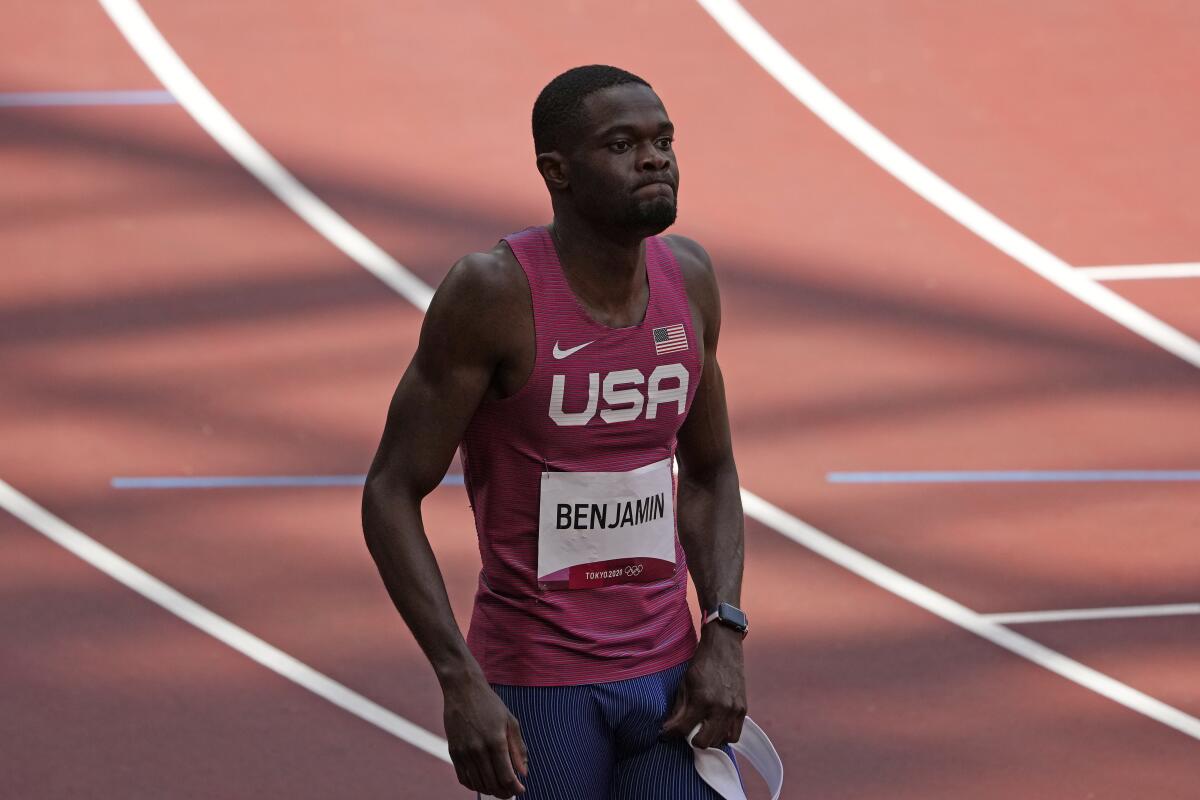
Gary Klein on the men’s 400-meter hurdles: Rai Benjamin posted the fastest time of his career, faster than the world record. And he did it on his sport’s biggest stage, the Olympic Games.
That, stunningly, was not enough to win a gold medal in the men’s 400-meter hurdles final.
In perhaps one of the greatest races in Olympic history, Karsten Warholm of Norway held off Benjamin and a blazing field to win in a world-record time of 45.94 seconds at Olympic Stadium.
Warholm broke his own record of 46.70.
Benjamin, a former USC athlete, finished in 46.1.
“If you would have told me I was going to run 46.1 and lose, I would probably beat you up and tell you to get out of my room,” Benjamin told reporters.
And if someone had told Warholm that Benjamin would run that time?
“I would have put myself on the first flight home,” Warholm said.
———
Gary Klein on women’s long jump: Many times during her historic career, four-time Olympian Brittney Reese won long jump competitions on her final attempt.
Her ability to come up big had helped her collect 10 Olympic and world championship medals, including a gold medal at the 2012 London Games.
Reese was in position to win an Olympic gold again Tuesday. She led for much of the competition before Malaika Mihambo of Germany took the lead by leaping 22 feet 11¾ inches on her final jump.
Reese, 34, had a final chance to win, but she came up short at 22-10½ and won the silver medal in the final event of her career.
“I had a great career,” she said. “I had a great journey. I’m just blessed. I’ve been in this sport for 13 years, so to finish my career with a silver, I really can’t complain. ... I’m used to beating people on the sixth jump. And I got beat on the sixth jump, so kind of funny to end my career that way. “
Tara Davis, a former Agoura High standout, finished sixth in her first Olympics. Her longest jump covered 22 feet 5¼ inches.
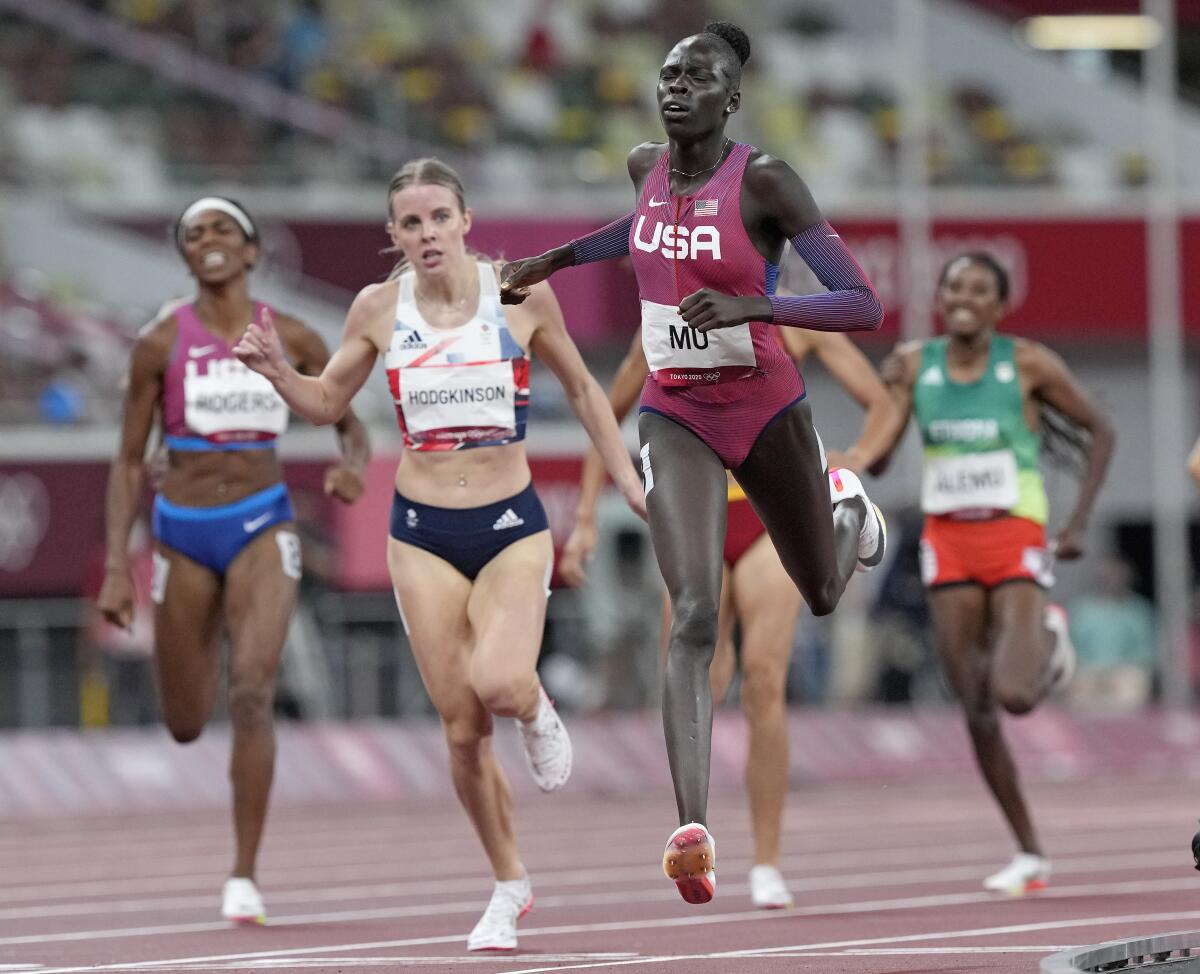
Athing Mu of the U.S. won the gold medal in the women’s 800-meters on Tuesday night.
Mu, 19, became the first American woman to win the event since Madeline Manning in 1968 at Mexico City.
Mu had breezed to victory in a preliminary heat and the semifinals, and she made it look easy again in the final, finishing in 1 minute 55.21 seconds
Keely Hodgkinson of Britain won the silver medal and Raevyn Rogers of the U.S. took bronze.
———
Elaine Thompson-Herah won the gold medal in the women’s 200 meters.
Thompson-Herah, who also won the 100-meters gold medal, completed her second consecutive sweep of the events.
Thompson-Herah finished in 21.53 seconds. Christine Mboma of Namibia won the silver medal and Gabrielle Thomas of the U.S. took bronze.
Soccer
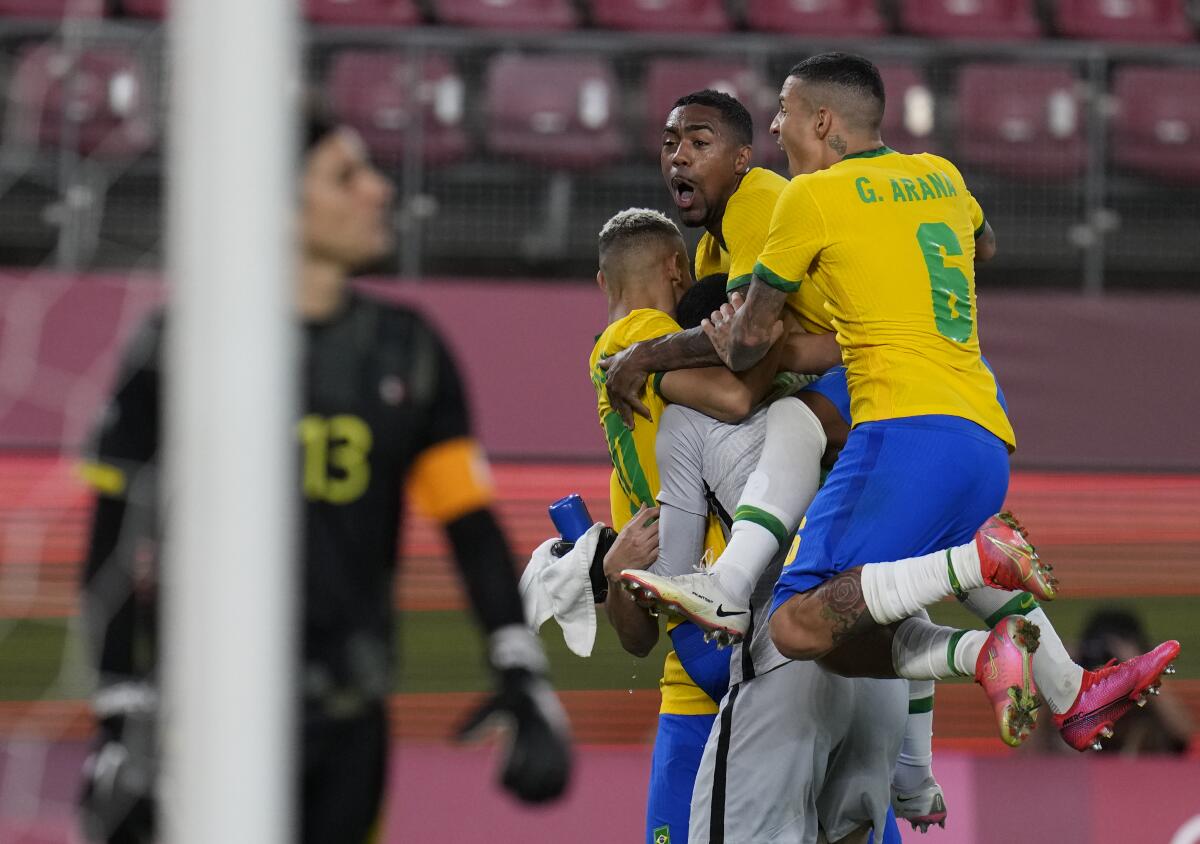
Kevin Baxter on Mexico men’s soccer: Brazil and Mexico have arguably the best U-23 soccer teams in the world, having shared the last two Olympic gold medals after meeting in the final of the 2012 Games.
And for more than 120 minutes Tuesday, they traded blows in a heavyweight battle worthy of another final. But only Brazil will play for the gold after winning a penalty shootout following a Tokyo Olympics semifinal that ended in a scoreless draw.
Brazil will play the winner of the second semifinal between Japan and Spain in Saturday’s final. Mexico will play the winner Friday in the bronze-medal game.
Brazil has allowed one goal in its last 396 minutes, but Mexico was clearly playing for penalty kicks in overtime, throwing its confidence behind Club America goalkeeper and team captain Guillermo Ochoa. But Ochoa didn’t stop any of Brazil’s four attempts in the shootout, while Brazilian keeper Santos was beaten just once.
Beach volleyball
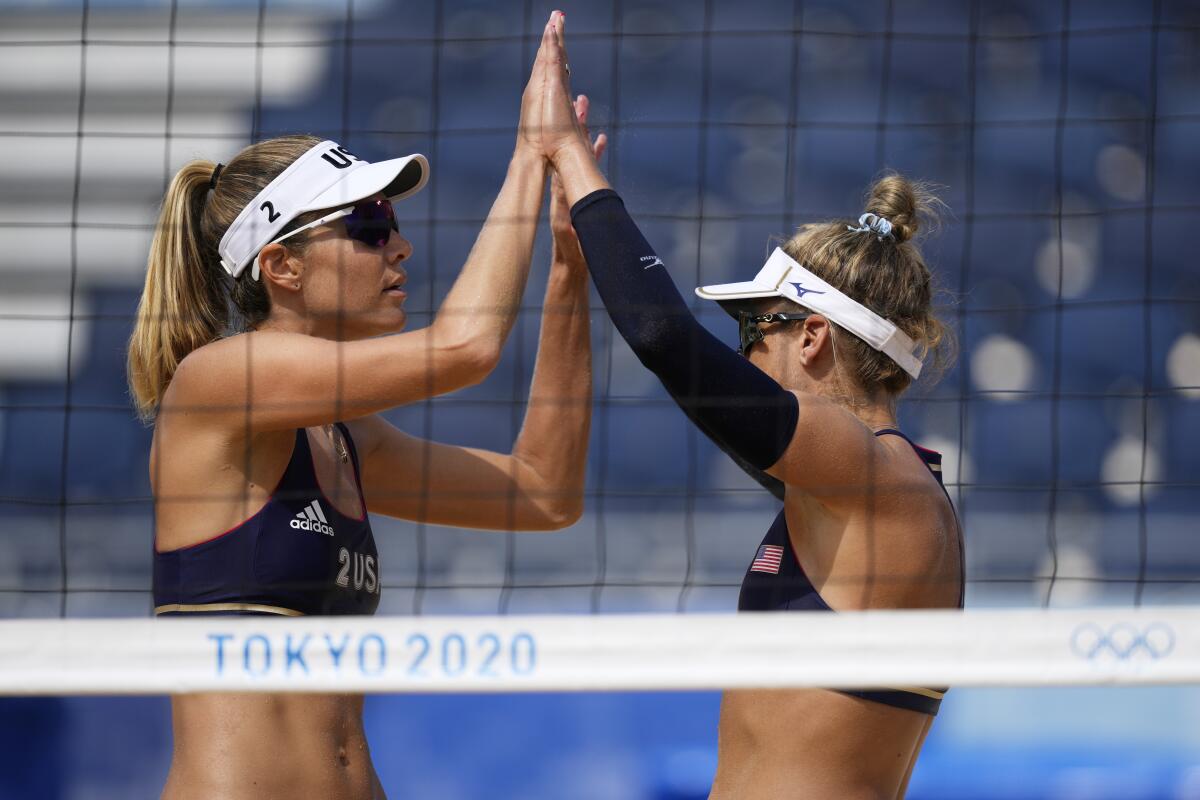
Ben Bolch on teammates in beach volleyball: Each time he introduced a beach volleyball partner to a friend, Patrick Powers used the same preface.
“Hey,” Powers would say, “here’s my new ex-partner.”
It was a reminder that nothing lasts in beach volleyball, especially partnerships. Players get hurt. They retire. They start to begrudge one another. Maybe one realizes he or she can do better with somebody else.
That’s all it takes for an allegiance to fray and a courtship to begin, resulting in a new pairing. Over one’s career the process repeats itself multiple times, partners discarding one another as easily as a badly ripped tank top.
“All partnerships are doomed to die,” said Karch Kiraly, the legendary beach player from UCLA who now coaches the U.S. women’s indoor team at the Tokyo Olympics. “Almost no partnership ever ended with neutrality and both people retiring at the same time.”
Such are the distinct challenges — physical, mental and emotional — of being on a team with just two members. The Dodgers and Lakers have no such issues.
Men’s basketball
Dan Woike on U.S. men’s basketball: The U.S. overcame a double-digit deficit and then nearly blew a double-digit lead before beating Spain 95-81.
Kevin Durant, the program’s all-time leading scorer in Olympics competition, had 29 points, while four others scored at least 10.
Ricky Rubio capped his amazing tournament by scoring 38, nearly delivering Spain to the semifinals by himself. Marc and Pau Gasol, likely playing together internationally for the final time, were held scoreless.
The U.S. will play Australia in the semifinals Thursday.
Until next time...
That concludes today’s newsletter. If you have any feedback, ideas for improvement or things you’d like to see, email us at sports@latimes.com. To get this newsletter in your inbox, click here.
Go beyond the scoreboard
Get the latest on L.A.'s teams in the daily Sports Report newsletter.
You may occasionally receive promotional content from the Los Angeles Times.




